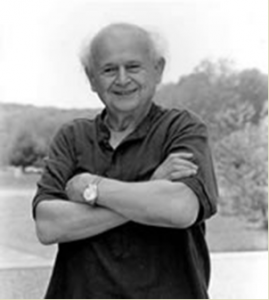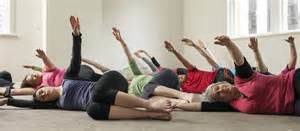“The quality of your life is the quality of your movement.” Moshe Feldenkrais 
I awoke the other morning to the above quotation, and it felt like one of my most respected teachers had come to give me a message of encouragement. Now deep in the daily discomfort and pain of rehabbing my shoulder, I’m longing for a return to the broad range of easeful movement I’ve experienced most of my life. I met Moshe in Dallas in the spring of 1981 when I drove from Fort Worth where I lived, to take part in a daylong workshop he was presenting. I’d heard of him through the Alexander Technique, http://alexandertechnique.com/ another system of somatic education I was involved with, and I knew this was a rare opportunity. Looking at his bio, my meeting with him came just before he stopped teaching in the fall of 1981. He died at age 80 in 1984. In spite of the short time I spent with him, the experience changed my life. http://www.feldenkrais.com/whatis
Moshé Feldenkrais was an Israeli physicist with a black belt in Judo who hurt his knee in a soccor match as a young man. He became an engineer and eventually founded a method of somatic education that uses gentle movements and directed attention to improve movement and enhance human functioning. One of the books he wrote around that time was titled, ”The Elusive Obvious.” wikipedia.org
Something happened just prior to my driving the thirty miles to Feldenkrais’s workshop that set the experience up as a life changing one for me. The night before I had gotten a call from one of my students who told me that the job I had held for two years as a social work professor at TCU, the one that had been listed nationally simply to fulfill the university’s affirmative action requirements, the same job that had been promised to me when I moved my family from Nebraska to Texas two years earlier, had been offered to a white male without a PhD. That morning I had decided to put this entire trauma drama out of my mind and attend the workshop as planned. But as I was driving I noticed my body going into a familiar response to extreme stress, so I pulled over to the side of the road and stopped my car.
Sitting in the drivers’ seat I began doing body awareness exercises to interrupt a movement pattern I had recognized in other situations of extreme stress. Ten years earlier two teenage boys had jumped me after I came out of my neighborhood bank and was attempting to get into my car in the parking lot. As I was sitting at the steering wheel and before I could get the door closed, one boy grabbed me to pull me out of the car. With the boy still attached to me, I slid across the front seat to the passenger side, unlocked the door and exited the car, all the while screaming at the top of my lungs. Shortly after I got home, the police called to say they had caught the boys. An off duty police officer happened to be at the bank observing the scene. He gave chase and captured them. The aftermath for me was the worst headache I’d every experienced and a toothache that resulted in my losing one of my front teeth.
It was that familiar sensation of tension above my front teeth that caused me to stop the car. “I may lose my job, but I’m not going to lose any more teeth,” I pledged to myself. I went into a meditative state to release the tension in my mouth and continued doing this even after I resumed driving. I arrived at the workshop just as it was beginning.
 I joined the roomful of people lying on the hotel ballroom floor doing the slow relaxing and releasing exercises directed by the master. I noted the pleasure of moving without tension, of having my awareness completely in the moment. Whenever my mind wandered away from the awareness of my movements, the trauma drama of losing my job triggered painful tension in my gut and my upper jaw. I got the image of myself as an animal opening its mouth to bare its teeth to an aggressor.
I joined the roomful of people lying on the hotel ballroom floor doing the slow relaxing and releasing exercises directed by the master. I noted the pleasure of moving without tension, of having my awareness completely in the moment. Whenever my mind wandered away from the awareness of my movements, the trauma drama of losing my job triggered painful tension in my gut and my upper jaw. I got the image of myself as an animal opening its mouth to bare its teeth to an aggressor.
It was at Moshe’s workshop that I noted not only how my body reacts to painful events in the external world, but also how to pattern interrupt these reactions, preventing them from continuing to harm me long after the event has ended. I discovered that choice point of the “Elusive Obvious” where, though it takes practice – when life gets tough, I can choose the pleasure of staying present to my body, and continuing aware of ways to move with ease and grace.

